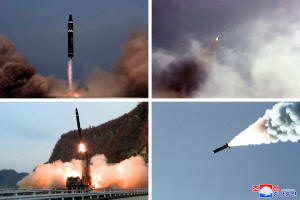Analysis-North Korea's missile launches show no scarcity of weapons
funding, materials despite sanctions
 Send a link to a friend
Send a link to a friend
 [November 08, 2022]
By Josh Smith [November 08, 2022]
By Josh Smith
SEOUL (Reuters) - North Korea's record year
of missile launches has shown its willingness to pour resources into
producing and deploying more weapons than ever - and sanctions have done
little to hinder their development, analysts say.
Last week the country fired more than 80 missiles, including its latest
short-range ballistic missiles (SRBMs) and a new variant of
intercontinental ballistic missile (ICBM), by far the North's most
launches in such a short period.
Although North Korean weapon costs are not known, ICBMs in other
countries can cost tens of millions of dollars, and SRBMs such as
Russia's Iskander up to $3 million.
Analysts said Pyongyang's willingness to fire such expensive devices
into the sea suggests the impoverished country's missile programme faces
few hurdles despite being banned by United Nations Security Council
resolutions.
North Korea must have either sufficient stocks of fuel and missiles,
including complex machinery such as engines and guidance systems, the
ability to produce new weapons quickly, or the ability to acquire what
it needs from abroad, said Mason Richey of Seoul’s Hankuk University of
Foreign Studies.

"Any way you look at it, it underscores how poorly sanctions have
performed and are likely to perform in the future," he said.
Many of the missile launches in the past few weeks have been SRBMs
unveiled in recent years, some of which appear to have been delivered to
operational units. North Korean state media showed older SCUD-type
missiles were also fired.
“The fireworks indicate that they have those missiles in numbers in
stock,” said Markus Schiller, a Europe-based missile expert.
Even the latest SRBMs are several years old, which means that North
Korea could have a stockpile, even if it could only build them at a slow
rate, he said. He added that some, such as the KN-25 SRBM, are
“definitely designed for production in higher numbers.”
FOREIGN NETWORKS
The scope of foreign assistance to North Korea's missile programme is
hotly debated.
South Korea may uncover new clues as to how North Korean missiles are
made when it analyses the debris it recovered from an SRBM that fell
offshore last week.
When South Korea gathered remnants of North Korean Unha space launch
rockets in 2012, it said it found components from Britain, Switzerland,
the United States, China, and the former Soviet Union.
[to top of second column]
|

Recent North Korean missile tests are
pictured in this undated combination photo taken at undisclosed
locations and released on November 7, 2022 by North Korea's Korean
Central News Agency (KCNA). KCNA via REUTERS

Analysts and sanctions experts say North Korea continues to rely on
materials and other inputs from overseas.
"Russia and China are where most of the overseas North Korean
ballistic missile procurement agents are based," said Hugh
Griffiths, a former coordinator for a U.N. panel of experts that
monitors sanctions on North Korea, and now an independent sanctions
consultant.
A U.S. government advisory said that among the technology and
materials most sought by North Korea were multi-axle heavy vehicles
to transport and launch ballistic missiles; steel, aluminium, and
speciality materials containing titanium; carbon fibre and filament
winders for making lightweight rockets; and solid propellant,
including aluminium powder and ammonium perchlorate.
"To obtain these components, North Korea uses an extensive overseas
network of procurement agents, including officials who operate from
North Korean diplomatic missions or trade offices, as well as
third-country nationals and foreign companies," the advisory said.
North Korea wants to import some 100 tons of solid propellant by
2030, according to the advisory. Griffiths said other materials are
small, nondescript and easy to smuggle.
"They could be shipped in some instances using fast parcel operators
like DHL," he said.
This year the U.S. sanctioned what it called “a network of
Russia-based individuals and entities complicit in helping the DPRK
procure components for its unlawful ballistic missile systems,"
including a North Korean diplomat in Moscow.
It also named networks of North Koreans and companies based in
Belarus and China.
In responses to the U.N., Russia said it did not have any
information on allegations of illicit work. China said it had
investigated the claims, and found no evidence.
Both countries have said they enforce the UNSC sanctions.
(Reporting by Josh Smith. Editing by Gerry Doyle)
[© 2022 Thomson Reuters. All rights
reserved.]
This material may not be published,
broadcast, rewritten or redistributed.
Thompson Reuters is solely responsible for this content.
 |